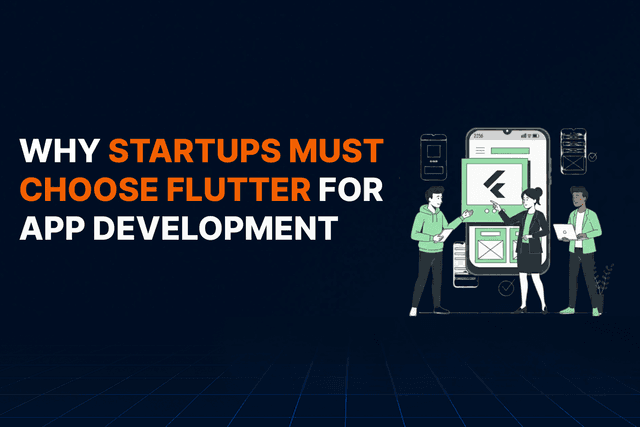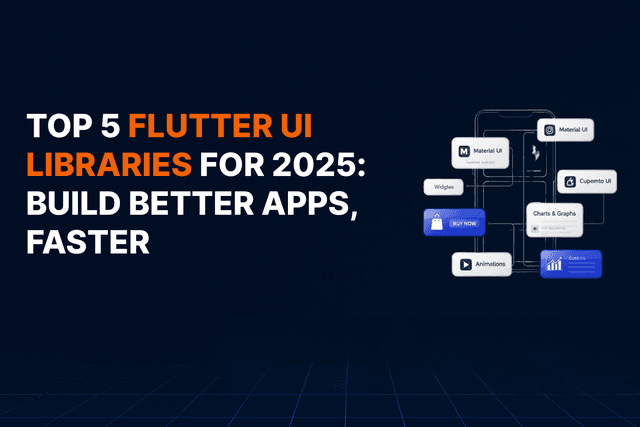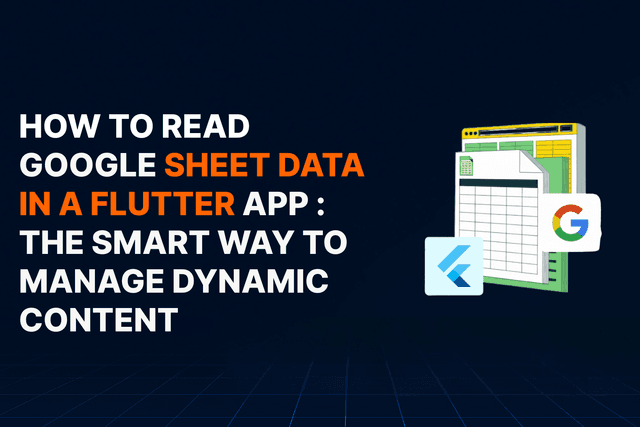Why Flutter Web App Development?
One codebase for mobile and web sounds perfect. But Flutter Web isn't right for every project. Here's when it works, when it doesn't, and how to choose wisely.
Why Flutter Web App Development?
You've got a Flutter mobile app. It's gorgeous. Smooth animations, happy users, everything's clicking. Then your boss walks in with that look.
"Can we make a web version?"
So you Google "Flutter for web development", and suddenly you're drowning in contradictory opinions. Half of Reddit says it's wonderful. The other half says you're crazy for even considering it. Someone on Stack Overflow is arguing about bundle sizes, while another developer is showing off their production Flutter web app serving millions of users.
Cool. Super helpful.
Here's the truth: Flutter can absolutely do web. But should it? For your specific project? That's the real question.
Let's cut through the hype and figure out exactly when Flutter web app development makes sense and when you should run screaming toward React.
The Flutter for Web Reality Check
First, let's get clear on what we're actually talking about here.
Flutter Web isn't just your mobile app magically appearing in a browser. It's a legitimate web deployment target that shares the same codebase as your mobile app. Same widgets, the same business logic, and the same Dart code.
Here's what that actually means for your business:
You write your code once. It runs on iOS, Android, and web. That's not marketing fluff; that's genuinely how it works. One team, one codebase, three platforms. The time and cost savings are real.
Your UI stays pixel perfect across every platform. That custom brand experience you spent weeks perfecting on mobile? It looks identical on the web. No "close enough" compromises.
But here's the catch nobody likes to mention:
Flutter Web isn't a React killer. It's not trying to replace Vue or Angular. It's not designed to build your company blog or marketing website. And what if SEO is critical to your business? We need to have a serious conversation.
Flutter Web shines for web applications, not websites. Think dashboards, admin panels, internal tools, and apps that happen to run in a browser. If you're building the next Medium or need organic search traffic, Flutter Web is probably the wrong tool.
Flutter for Web vs Traditional Web Frameworks: The Honest Comparison
Let's address this directly and provide specific details.
Flutter Web approach:
Your app compiles to JavaScript or WebAssembly. It uses a canvas-based rendering engine (or HTML elements, depending on your renderer choice). Flutter draws your entire UI, not styling it with CSS.
Traditional frameworks (React, Vue, Angular):
They work with the DOM directly. Use standard web technologies. Get rendered the way browsers expect. Play nice with search engines.
Where Flutter Web wins:
Code reusability is unmatched. If you already have a Flutter mobile app, you can literally reuse 70 to 90% of your code for web. We're not talking about sharing some utility functions. We're talking about your entire UI layer, state management, and business logic.
Development speed for existing Flutter teams is insane. There is no need for context switching between React for web and Flutter for mobile. There is a single mental model, a single set of tools, and a unified debugging process.
UI consistency is perfect. Not "really close" or "we matched the designs pretty well." Identical. The same widget code produces the same visual result everywhere.
Where traditional frameworks win:
SEO is their home turf. Search engines crawl HTML naturally. Flutter's canvas rendering? Not so much. Yes, there are workarounds, but they're for a reason.
Initial load time is typically faster. React sends HTML and hydrates it. Flutter needs to download its rendering engine first. For content sites where first paint matters, that's a big deal.
The ecosystem is massive. Need a specific npm package? It probably exists. Need a Flutter Web package? It might exist; check the compatibility table, and good luck.
Real-world performance breakdown:
Initial load: Traditional frameworks typically load 30 to 50% faster. Flutter's rendering engine isn't tiny.
Runtime performance: Flutter often wins here. Once loaded, Flutter's rendering is smooth and consistent. No layout thrashing, no CSS specificity wars.
Bundle size: A basic Flutter Web app starts around 1.5 to 2 MB. That's before your actual app code. React can ship production-ready apps under 200KB. The difference matters for users on slow connections.
When Flutter Web Actually Makes Sense
Stop trying to force Flutter Web into every project. Use it where it shines.
You should absolutely use Flutter Web if:
You already have a Flutter mobile app and need a web version. This is the no-brainer scenario. Why rebuild everything in React when you can reuse your existing codebase?
You're building internal tools or dashboards. Your employee portal doesn't need SEO. Your admin panel won't be found via Google search. These are perfect Flutter Web candidates.
You need pixel-perfect UI consistency across platforms. If your brand guidelines are strict and your design team will notice a 2px difference, Flutter's consistency is worth its weight in gold.
Your team already knows Dart and Flutter. Retraining developers on JavaScript frameworks takes time and money. Leverage existing skills.
You should probably skip Flutter Web if:
SEO drives your business. E-commerce sites, blogs, marketing pages, anything that needs organic traffic. Use a traditional framework. Don't fight this battle.
You're building a web-only project with no mobile plans. Why add Flutter's overhead when you could use tools optimised specifically for the web?
You need the absolute fastest initial load time. Every millisecond matters for conversion rates on public-facing sites.
You're relying heavily on web-specific features that don't have Flutter packages yet. Check package compatibility before you commit.
Web Development with Flutter: What Actually Works
Let's get practical. What does Flutter Web development actually look like in 2025?
Hot reload is still magical.
Change your code, and see it instantly in the browser. No webpack rebuild waiting. No full page refresh. It's the same instant feedback you get in mobile development, and it's addictive.
Your existing Flutter knowledge transfers completely.
Same widgets. Same state management (Provider, Riverpod, and Bloc all work). Same patterns. If you know setState() and StreamBuilder on mobile, you already know them on web.
Progressive Web Apps work beautifully.
Flutter Web apps can work offline. They can be installed like native apps. They can send notifications. All the PWA goodness you expect.
Integration with backend services is identical.
Your Firebase code? Works. Your REST API calls? Work. Your GraphQL queries? Work. The networking layer doesn't care that you're on the web.
Real code that works across platforms:

That exact code runs on iOS, Android, and web without changes. That's the promise, and it actually delivers.
The Challenges You Actually Need to Know About
Let's talk about the elephants in the room. Flutter Web isn't perfect.
SEO is genuinely challenging.
Search engines are getting better at rendering JavaScript, but Flutter's canvas-based rendering throws them off. Google can index Flutter Web apps, but it's not as reliable as traditional HTML.
The workarounds exist: server-side rendering, meta tag optimisation, and sitemaps. But they're workarounds. If SEO is mission critical, you're fighting upstream.
Initial load time requires optimisation.
Out of the box, Flutter Web apps take longer to load than optimised React apps. You can improve this with code splitting, lazy loading, and choosing the right rendering mode, but it requires effort.
Use the HTML renderer for better load times but less consistent rendering. Use the CanvasKit renderer for perfect rendering but larger bundles. Pick your tradeoff.
Browser compatibility has improved but isn't universal.
Modern browsers (Chrome, Firefox, Safari, and Edge) handle Flutter Web great. IE11? Not happening. Older mobile browsers? Hit or miss.
For internal tools where you control the browser, this is fine. For public websites targeting everyone, it's a consideration.
Plugin ecosystem gaps are real.
Not every Flutter package supports web. That awesome camera plugin you love? Might not work on the web. Always check the platform compatibility in pub.dev before you commit to a package.
The community is filling gaps fast, but mobile-first packages still outnumber web-compatible ones.
Flutter for App Development: The Full Picture
Here's the thing about Flutter: it started as a mobile framework. That's its DNA.
Web support is genuinely production-ready now, but it's an extension of Flutter's core strength, not the main event. And that's actually okay.
The multi-platform vision is real:
One codebase targeting iOS, Android, web, Windows, macOS, and Linux. It's not marketing hype anymore. Developers are shipping production apps across all these platforms.
But let's be realistic about what "one codebase" actually means. You'll still need platform-specific adjustments. Navigation patterns differ between mobile and web. Responsive layouts require different thinking. Desktop apps need keyboard shortcuts and window management.
It's not write once, run anywhere. It's write once, adapt everywhere. Still way better than maintaining completely separate codebases.
When to go all in on Flutter:
You're building mobile first with web as a secondary target. Start with iOS and Android, then extend to web when you need it.
You're creating internal enterprise applications where you control the environment. Employee portals, admin dashboards, internal tools. These are Flutter's sweet spot.
You're building data-heavy applications that need consistent UI. Financial dashboards, analytics tools, and monitoring systems. Anything where the interface complexity benefits from Flutter's widget system.
When Flutter might be overkill:
Simple CRUD web apps that could be built in a weekend with Next.js.
Content-heavy websites where SEO and fast initial load are non-negotiable.
Projects where your team would need to learn Dart from scratch and you don't have mobile plans.
When Custom Development Makes the Difference
Sometimes off-the-shelf Flutter Web isn't enough. Sometimes you need something purpose-built.
You need custom development when:
Your business logic is genuinely complex. Multi-tenant systems, sophisticated workflows, integration with legacy enterprise systems. This stuff doesn't fit neatly into standard patterns.
You're connecting to existing infrastructure. Your Flutter web app needs to talk to SAP, integrate with custom APIs, or work with specialised databases.
You need optimisation beyond standard practices. Custom rendering strategies, specialised caching layers, or performance tuning for your specific use case.
This is where Voxturr steps in.
VoxturrLabs builds custom Flutter web applications for companies with requirements that go beyond standard implementations. We're talking tailored solutions that integrate with your existing systems, optimised for your specific performance needs, and architected for your growth plans.
Need a Flutter web app that connects seamlessly with your ERP? We build that. Want a multi-platform application that shares a custom backend? We architect that. Looking for performance optimisation that standard implementations don't provide? We deliver that.
The difference between generic Flutter Web development and custom Flutter solutions is the difference between buying off the rack and getting something tailored to fit.
Making Your Decision
Stop overthinking this. Here's your framework.
Choose Flutter Web if:
-
You have an existing Flutter mobile app (duh)
-
Building internal tools where SEO doesn't matter
-
Need UI consistency across platforms
-
Your team knows Dart/Flutter already
-
Creating dashboards or data-heavy applications
Choose traditional web frameworks if:
-
SEO is critical to your business model
-
Building content-heavy websites
-
Web-only project with no mobile plans
-
Need the absolute fastest initial load
-
Your project is simple and doesn't benefit from Flutter's strengths
Consider custom Flutter development if:
-
You have complex enterprise requirements
-
Need specific integrations with existing systems
-
Standard solutions don't fit your use case
-
Building something that needs to scale significantly
-
Want expert guidance on architecture decisions
The tool doesn't matter. The right tool for your specific situation matters.
The Bottom Line on Flutter Web App Development
Flutter Web isn't a silver bullet. It's not the right choice for every project.
But when does it fit? It's genuinely powerful. The ability to share code across mobile and web, maintain UI consistency, and leverage existing Flutter expertise. These advantages are real and valuable.
Just don't force it where it doesn't belong. A marketing website that needs SEO? Build it in Next. js. An internal dashboard for your team? Flutter Web might be perfect.
Know your requirements, understand the trade-offs, and pick the tool that actually solves your problem. Not the one that's trending on Twitter this week.
Building something complex that needs custom Flutter web development? The Voxturr team specialises in customised Flutter solutions that integrate with your existing systems and scale with your business. We don't do cookie-cutter implementations. We build Flutter applications designed specifically for your requirements.
Talk to us about tailored Flutter web solutions, and let's figure out if Flutter Web is right for your project or if you need something different entirely.
Frequently Asked Questions
Q1: Is Flutter good for web development?
Yes, but with context. Flutter excels at web applications (dashboards, tools, SPAs) but struggles with content-heavy websites that need SEO. If you're building an app that happens to run in a browser, Flutter Web is excellent. If you're building a blog or marketing site, use Next.js or similar.
Q2: Can I use Flutter for web app development in 2025?
Absolutely. Flutter Web is production-ready and powering real applications at scale. Companies like BMW, Alibaba, and others use Flutter Web in production. The ecosystem has matured significantly.
Q3: What's the difference between Flutter for web vs traditional frameworks?
Flutter uses a single codebase across platforms and renders with its own engine. Traditional frameworks are web native and render HTML/CSS directly. Flutter wins on code reuse and UI consistency. Traditional frameworks win on SEO and initial load time.
Q4: When should I hire custom Flutter developers?
When your requirements go beyond standard implementations. Complex integrations, enterprise-scale applications, specialised performance needs, or custom architecture requirements all benefit from expert Flutter development rather than generic solutions.

Gaurav Lakhani is the founder and CEO of Voxturrlabs. With a proven track record of conceptualizing and architecting 100+ user-centric and scalable solutions for startups and enterprises, he brings a deep understanding of both technical and user experience aspects. Gaurav's ability to build enterprise-grade technology solutions has garnered the trust of over 30 Fortune 500 companies, including Siemens, 3M, P&G, and Hershey's. Gaurav is an early adopter of new technology, a passionate technology enthusiast, and an investor in AI and IoT startups.

Ready for a Next-Level of Enterprise Growth?
Let's discuss your requirements
You May Also Like

Flutter App Development
Why Startups Must Choose Flutter for App Development
How Flutter Reduces Development Costs, Accelerates Time to Market, and Delivers Near-Native Performance for Modern Startups
8 min read

Flutter App Development
Best Backend for Flutter: Which Cloud Services Actually Work in 2026?
Firebase vs Supabase vs AWS Amplify: A practical guide to choosing the right backend for your Flutter app without the hype or surprises.
9 min read

Flutter App Development
5 Flutter App Development Mistakes- What to Avoid and Why?
As a developer, you know that building cross-platform apps with Flutter can be incredibly powerful and efficient to bring your ideas to life. With its ease of use, speed of development, and seamless integration with native platforms, Flutter app developme
2 min read

Flutter App Development
Top 5 Flutter UI Libraries for 2026: Build Better Apps, Faster
Your Flutter UI Toolkit Just Got a Major Upgrade
9 min read

Flutter App Development
Can Flutter Build Enterprise-Grade Desktop Applications? The 2025 Reality Check
An honest 2026 reality check on when Flutter desktop actually works for enterprise apps, where it struggles, and how CTOs should decide.
25 min read

Flutter App Development
Why Flutter is the Go-To Choice for Start-ups
Discover why Flutter is the go-to framework for startups — cost-efficient, scalable, and high-performance for building cross-platform mobile apps.
6 min read

Flutter App Development
Flutter vs Traditional Enterprise App Development [2025]
Flutter vs native for enterprise apps: cost, speed, performance, UI, integrations, and maintenance. A practical guide for CTOs choosing the right approach.
7 min read

Flutter App Development
How to Read Google Sheet Data in a Flutter App
A practical guide to building dynamic, easily-updatable Flutter apps using Google Sheets as a lightweight CMS.
18 min read